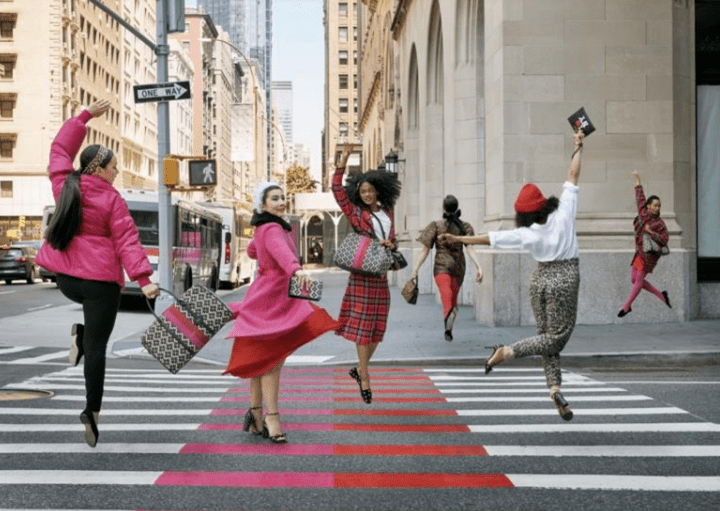McDonald’s sets threshold for closing indoor dining, Americans want employee vaccine status shared in ads, and Starbucks responds to employee unionization effort
Also: Kate Spade promotes NYC artists’ mental health, Nike gives employees the week off, and Fortnite introduces MLK experience.
Hello, communicators:
Luxury fashion brand Kate Spade is promoting the mental health of New York City artists with its Fall 2021 campaign, enlisting choreographer Dylan Pearce along with a group of New York performers who “invite a renewed sense of optimism to the streets” and “utilize dance as a mode of transportation” to spotlight the resilience of New York, according to a press release shared with PR Daily.
As part of the campaign, the brand will also launch a TikTok hashtag challenge intended to engage customers from around the globe.

Courtesy of Kate Spade
The campaign will also put mental health at the heart of Kate Spade’s social impact work by building on its ongoing partnership with The National Council for Mental Wellbeing and will donate an additional $75,000 to provide Mental Health First Aid training, along with mental health education workshops, to New Yorkers within the arts community.
“We are so proud to expand our partnership with The National Council for Mental Wellbeing this Fall,” said Kate Spade New York CMO Jenny Campbell. “This donation is an important piece of our love letter to New York, allowing us to continue to support the local community who has given so much of themselves during the pandemic to create joy and optimism.”
The focus of this campaign evokes a deeper connection for the brand to mental health issues without explicitly referencing the untimely passing of Kate Spade herself, who took her life in June 2018 after struggling with bipolar disorder for several years. By focusing on the mental health of NYC artists, this campaign emphasizes how your purpose and social impact work can fortify deeper roots of your brand’s DNA in a tasteful and respectful way.
Here are today’s top stories:
McDonald’s shares guidelines for closing indoor dining rooms
As the Delta variant of COVID-19 continues to spread, McDonald’s is sharing messaging with its franchise owners about banning indoor dining once more at its franchises. The fast-food chain first closed indoor dining in 2020, but reopened the dining rooms in 70% of its locations by July of 2021 and had planned to open 100% of its indoor dining locations by Labor Day.
“We have a much deeper sense of what actions make a difference for the safety of our restaurant teams and crew,” McDonald’s USA President Joe Erlinger said during a Wednesday meeting, according to the materials. In Wednesday’s conference call, McDonald’s executives recommended franchisees consider closing indoor seating in counties where Covid cases exceed 250 per 100,000 people on a rolling three-week average. The materials did not specify how many locations have shut indoor seating or could soon do so.
“We’re monitoring the impact of the Delta variant closely and recently convened together with our franchisees to underscore existing safety protocols, reinforce our people first approach and provide updates on the rise in cases in the country,” McDonald’s said in a statement on Friday.
What it means:
As the Delta variant upends the reopening plans of countless businesses and restaurants, and forces brands like Taco Bell to announce innovative new restaurant concepts, McDonald’s messaging highlights the fact that arming your partners with data during times of uncertainty is crucial during a crisis. The brand’s franchisee communication also shows how the company has learned hard lessons from its “diaper mask” lawsuit that alleged the company “misleadingly sought through extensive advertising to reassure customers” that its stores had effective safety protocols in place.
MEASURED THOUGHTS
In a new study from The Harris Poll and Ad Age, 76% of those polled felt companies that require employee vaccinations should put that fact in their advertising and 69% said that consumers have the right to know whether or not a brand requires employees to be vaccinated.
These numbers suggest that brands willing to highlight the health and safety measures it takes to protect its employees and customers will earn a reputational win.
“Most people in this country would prefer a brand that cares,” Noah Posnick, VP and head of production for advertising production consultancy Mbc services, told The Harris Poll. “It would be smart if brands taking this stance made it known, but not in a way where they’re loudly patting themselves on the back.”
THE WORKPLACE
Matt Marrazzo, Nike’s senior manager of global marketing science, announced on LinkedIn that the company is giving all employees an extra week off:
As Nike leads the way with a practice much more commonly practiced by European companies, Marrazzo’s marketing title emphasizes the extent to which employee communications are essentially external communications in today’s cultural climate. His words on the relationship between employee well-being and business performance, meanwhile, echo a larger conversation around mental health in the workplace by suggesting that improving the quality of workplace culture can have a more substantial impact on productivity than increasing the quantity of time spent working.
TAKE OUR SURVEY
If you’re looking for benchmark data to take to your bosses the next time you ask for a raise or search for a new job, lend us a hand—and help yourself and your peers while you’re at it. Participate in Ragan’s Salary & Workplace Culture Survey, a comprehensive look at salaries, benefits, culture, bonuses and other aspects of the job in a fast-moving industry.
Both internal and external communicators are encouraged to participate.
By taking part, you will receive a $150 discount to a Ragan virtual conference of your choice and be entered to win one of five $50 gift cards. All who complete the survey will receive a full report on the findings. Responses are anonymous. Enter by Sept. 17.
Take the Ragan Salary & Workplace Culture Survey now.
TECH TALK
TIME Studios partnered with Epic Games, the company behind the massively popular video game Fortnite, to craft an experience that will immerse players in the entirety of Dr. Martin Luther King’s “I Have a Dream” speech and the history around it within the game:
The experience, dubbed “March Through Time,” will let players travel through the fictional city of D.C. 63 to visit the Lincoln Memorial and United States National Mall, where Dr. King gave the iconic 17-minute speech. The experience includes collaborative mini-game quests and side quests that bring to life important themes of Dr. King’s work.
This experience emphasizes how your brand or organization can get in on marketing and communications campaigns using emerging technologies like VR, AR and the mixed reality of Epic Games’ multiverse without having all the tools and technical expertise in-house. You can consider a partnership with companies that have the knowhow to make such campaigns happen while keeping the mission and values of your original idea intact.
Join Raffaella Camera, head of brands & advertisers solutions at Epic Games along with Snapchat US creative lead Erik Harte and “The Augmented Workforce” author Cathy Hackl at Ragan’s Virtual Social Media Conference on 9/9 and 9/10 for a panel conversation about the many opportunities for brands to get in on AR, VR and mixed reality.
Starbucks responds to employee union push
Employees at Starbucks locations in the Buffalo, New York area are planning to form a union called Starbucks Workers United, having filed employee petitions from three stores in the area and asked The National Labor Relations Board to hold elections on union representation.
They announced the plans in a letter to Starbucks president and CEO Kevin Johnson:
We are proud to announce that we have formed an organizing committee of SBWorkersUnited in the Buffalo region. Here is our letter to Kevin Johnson! pic.twitter.com/eOzPE4u1vy
— Starbucks Workers United (@SBWorkersUnited) August 23, 2021
After the workers’ announcement last week about forming the union, Starbucks said in a statement, “We respect our partners’ right to organize but believe that they would not find it necessary given our pro-partner environment.”
After workers in Buffalo announced their union last week, they received a text message from a manager inviting them to one of several listening sessions on company time to “discuss what their experience with the company overall has been.” Mr. Borges, the Starbucks spokesman, said listening sessions were standard at the company’s U.S. stores.
“We proudly create the space and forums for open and honest conversation as it relates to establishing and maintaining a great work environment,” he said.
In their letter, the committee members wrote that they were unionizing not in response to any particular policies but to achieve a “true partnership” with Starbucks. “We want the company to succeed and we want our work lives to be the best they can be,” the letter said.
Why it matters:
As employers face labor shortages and workers feel emboldened to push for change, this unionization drive arrives at a time when the company has no choice but to listen. The unionization letter’s mention of hopes for a “true partnership,” however, suggests that the Starbucks is out of step with the needs and feelings of employees.
Simply creating employee communication channels is not enough. Those channels must be optimized to create an environment where employees feel empowered to opt-in and respond on their own terms, including being able to schedule listening sessions at a time that is convenient for them and communicate with colleagues that they feel safe speaking openly with.








It’s a marvelous opportunity for McDonald’s to point out that “people need the nourishment” which is one reason why the restaurants stay open as much as possible.
It’s certainly true. Although critics complain that fast food restaurants have too much salt, the truth is that (a) people don’t go to fast food places to get salt, (b) people can hold down salt intake by not adding salt to what is served, and (c) nutrition experts agree that there’s a lot of protein and other value in McDonald’s menu items.
A common knock on fast foods is that they don’t have much of this vitamin or that but the truth is that we can buy a daily pill that at low cost gives us a high number of vitamins plus many important minerals. But no pill really gives us anything near the protein we need daily. Nor the flavor and happiness of many McDonald’s foods.
It’s not only true that we are what we eat but it’s also true that we may not be wise nor self-protective enough if we don’t eat enough of the nutrients that some fast foods can give us.
The Starbucks statement would be better if it said not “believe that they would not find it necessary given our pro-partner environment” but instead said “it would mean more money for our hard-working partners if the money all went to our partners, not partly to union organizers.”
The PR Daily “why it matters” statement would be better if it recognized that employees may for good reason feel MORE safe “speaking openly with colleagues” in management—people who get money from the same customers as other employees—than with union organizers whose money comes not from Starbucks coffee drinkers but from employee earnings.